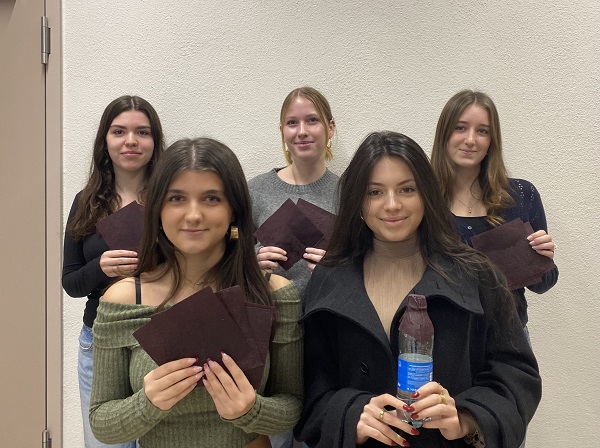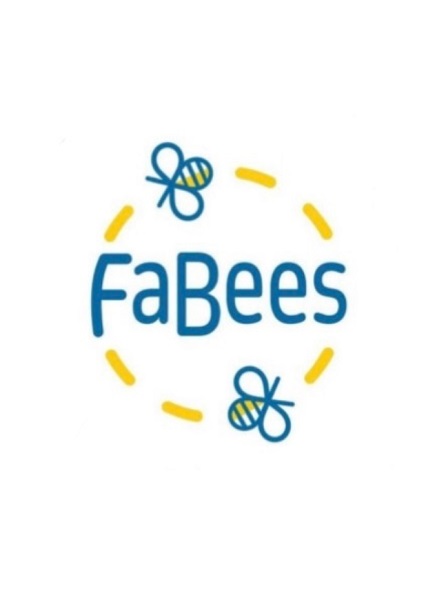 Credit: FaBees
Credit: FaBees
Founded in September 2024, FaBees has embarked on a mission to offer an innovative and sustainable alternative to aluminium and plastic packaging - in the form of beeswax wraps.
As co-founder Elina Broodman explained to Chronicle.lu, a team of five students from Lycée Michel Rodange founded FaBees last autumn, as part of the "Mini-Entreprises" initiative run by Jonk Entrepreneuren Luxembourg (JEL).
"We are passionate about sustainability and deeply concerned about the future of our planet. This shared commitment led us to create a product that aims to reduce waste and offer an eco-friendly alternative to everyday packaging," explained Elina. The resulting product is a beeswax-treated fabric wrap, designed to keep food fresh and help reduce reliance on aluminium (tin) foil and plastic wrap.
Elaborating on the Mini-Entreprises experience, Elina shared: "Our journey has been significantly supported by the 'Minientreprise Option', which has provided us with invaluable guidance and resources. The teachers involved in the option have been instrumental in supporting us step by step, offering detailed feedback and advice on refining our product". The team also received "a short yet very helpful coaching session" with Luxcaddy co-founder Jacques Lorang, whose advice helped the team "navigate the challenges of bringing a sustainable product to market". Added to this was coaching offered by JEL, which offered "a broader understanding of entrepreneurship, enabling us [FaBees] to make strategic decisions as we grow our venture".
Whilst still in the early stages of this venture, the FaBees team have developed a working prototype "after several months of trial and error". As Elina Broodman explained, this prototype is "a sustainable alternative to single-use packaging, designed to reduce environmental waste". The team developed a fabric-based solution which people can use to wrap the product around everyday items, such as tins, bottles and fruit, to keep food fresh. "This innovation serves as an eco-friendly substitute for aluminium foil, which has a high environmental cost in terms of CO2 emissions, electricity usage, and water consumption during its production. By offering a reusable alternative, we aim to reduce reliance on materials that contribute to the growing global waste crisis," said Elina.
Among the main challenges during the development of the prototype was "determining the optimal methods to obtain a functional prototype". Elina explained that this "included determining the right amount of beeswax to use and finding the best methods to apply it. We experimented with smaller and larger fabrics, testing different approaches for melting the beeswax, such as using the oven and an iron. Initially, we struggled to achieve the desired consistency for the fabric to stick properly. Our early prototypes failed to unfold their purpose as the fabric wouldn't adhere as needed".
"However, through persistence, numerous failed attempts, and a willingness to keep refining our approach, we eventually developed a functional prototype that meets our requirements for packaging," Elina added.
FaBees is "eager to begin production soon". Elina elaborated: "While our next steps toward production are still being discussed, we are excited about sourcing beeswax from our school's rooftop garden and from local producers. We plan to share more details about the production phase as soon as we finalise these plans".
In mid-January 2025, FaBees will present the project at the JEL general assembly meeting, where the team "hope to further engage with the entrepreneurial community and raise awareness of sustainable alternatives to common household packaging".
Reflecting on the relevance of this project in today's world, both in Luxembourg and beyond, Elina stated: "As global concerns about waste, CO2 emissions and unsustainable production practices grow, we are committed to offering a solution that aligns with the principles of a circular economy. By replacing single-use packaging with an eco-friendly, reusable alternative, we hope to contribute to a more sustainable future. In Luxembourg, where environmental awareness is high, our project has the potential to resonate with consumers and businesses alike". The goal is then to "expand this impact beyond Luxembourg's borders, encouraging widespread adoption of sustainable practices".









